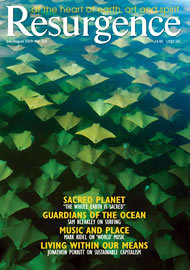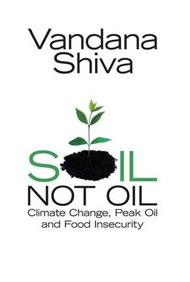THE MOST CREATIVE and necessary work that humans do is to work with the soil as co-producers with Nature. Human effort and knowledge based on care for the soil prevents and reverses desertification, the root of collapse of so many historical civilisations. Rebuilding soil fertility is the very basis of sustainable food production and food security. There is no alternative to fertile soil to sustain life, including human life, on Earth. It is living soil that provides sustainable alternatives to the triple crises of climate, energy and food. No matter how many songs on your iPod, cars in your garage, or books on your shelf, it is plants’ ability to capture solar energy that is the root of it all. Without fertile soil, what is life?
The transition from oil to soil is a multi-dimensional transition of economy, politics, and culture. First, it is an economic transition from a fossil fuel-driven globalised economy – one that favours corporations by subsidising oil and outsourcing costs – to a network of renewable energy-driven, climate change-resilient, local economies. These living economies are grounded in the soil, literally and metaphorically. They are localised, which reduces our ecological footprint on the planet while enhancing our wellbeing. Economies rooted in the soil are centred on Nature and people. The driving force is maintenance of life, today and in the future. Their currency is not money but life itself.
Second, the transition from oil to soil is a political transition. It is a transition from undemocratic political structures – which impose globalisation and a fossil fuels infrastructure on society and force the large-scale uprooting of peasants and indigenous peoples – to a decentralised democracy in which local communities have a say in what happens to their land and their lives. In this sense, soil is a metaphor of decentralised and deep democracy. As David Bosshart writes, “Consumer democracy is the gasoline for the bulldozer of globalisation.” Consumer democracy is a pseudo-democracy associated with economic dictatorship; it desertifies the soil of real democracy. Authentic democracy, like plants, grows from the ground up. It is fertilised by people’s participation.
Third, the transition from oil to soil it a cultural transition – from deadly consumerism to reclamation of our rightful place as co-creators and co-producers with Nature. The shopping mall and the supermarket are temples of consumerism through which global corporations seduce us into participating in the destruction of our productive capacities, our ecological rights, and our responsibilities as Earth citizens. Soil teaches us how to be as peasants; the soil is also protector. As globalisation violently pushes peasants off the land, the soil symbolises another culture: a culture of nonviolence, a culture of permanence, a culture of dignity in work, a living culture for the protection and renewal of life.
The convergence of these three crises provides us with the convergence of three opportunities – to create living economies, living democracies, and living cultures. Earth Democracy grows in the fertile soil shaped by the Earth, the human imagination, and human action.
The age of oil has symbolised a rule of capital, of centralised control and coercive government, of pollution and non-sustainability, of injustice and inequity, of violence and war. The age of soil symbolises the age of Gaia, of the flowering of diversity and democracy, of justice, sustainability and peace.
We will either make a democratic transition from oil to soil or we will perish. The poor, the weak, the excluded, the marginalised are threatened today. In the short term, we can continue to extend the profits and consumerism of the privileged by further dispossessing the poor. But tomorrow even the rich and powerful will not be immune from Gaia’s revenge and the revenge of the billions of dispossessed. We will either have justice, sustainability and peace together or we will descend into ecological catastrophe, social chaos, and conflict.
Soil, not oil, offers a framework for converting the ecological catastrophe and human brutalisation we face into an opportunity to reclaim our humanity and our future. •
Soil Not Oil: Climate Change, Peak Oil and Food Insecurity by Vandana Shiva is published by Zed Books. Readers of Resurgence may obtain the book direct from the publisher at the discounted price of £10.00 (RRP £12.99) + free postage and packing in the UK. Call Ruben at Zed Books on 020 7837 4014 and quote the reference SOIL09.
Vandana Shiva is a campaigner for ecological rights, and teaches regularly at Schumacher College in the UK and The School of Seed in India.







